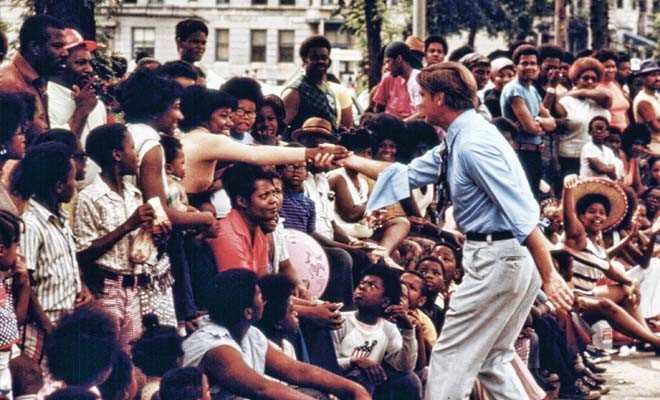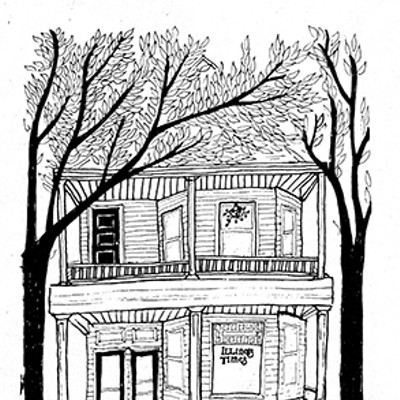
No, that’s not Bruce Rauner practicing his inauguration speech, but Dan Walker, delivering his, in 1973. In personality and political style, these two business successes from the Chicago suburbs are father and son. During his campaign for governor, Walker had pushed buttons worn smooth from long use by underdogs without a platform. He railed against the bureaucrats, the special interests, the experts, the machine. As Rauner is doing, Walker’s anger mobilized a constituency of the discontented, the pissed off, the confused, the uninformed. And Walker, like Rauner, brought an attitude rather than an agenda to the race.
Rauner is personally liberal while conservative politically, and Walker was conservative personally while liberal politically, but each is independent by nature – independent of party, independent of government experience, and largely independent of ideas. Rauner’s over-simple analyses of Illinois’ complex economic problems (lower taxes, break the unions) remind me of Walker’s naïve belief that the miseries of the Commonwealth, like the miseries of the wider world, were caused by Beelzebub – in the Commmonwealth’s case, one named Daley.
Rauner’s first TV commercial (“This old watch cost me 18 bucks”) was vintage Walker in the art of its symbolism and the condescension of its message. Walker favored expensive suits as befits an executive for Montgomery Ward, but affected a working man’s bandanna and chambray work shirt and jeans for his famous walk through southern Illinois that led him to the governor’s mansion. Rauner sensibly does his walking on TV ads, but the Everyman pose is much the same, as is the wardrobe, in his case a Carhartt work jacket of the sort favored by dudes posing as Montana ranchers.
All of this would merely be interesting, were it not for the fact that Walker’s experience in Springfield probably prefigured Rauner’s. What matters in a governor is his skill at governing and, like the rookie Walker, Rauner has run nothing more complicated than meetings. As a manager, Walker was a failure. He made the mistake, common among businesspeople who enter public service, of thinking that a governor is a merely a CEO with fewer perks; he didn’t realize that being a boss is not the same as being a leader.
The editors of Crain’s Chicago Business are aware of the risks. In their recent primary endorsement of Rauner, they wrote, “We’re not so naive as to think that an outsider like Mr. Rauner can singlehandedly shake up the culture of Springfield, as his stream of ads would have us believe. The Statehouse is not a boardroom where a CEO snaps his fingers and everyone jumps.” I wonder if Bruce Rauner knows that, or whether, like so many successful businesspeople, he believes that getting everyone to jump merely requires snapping his fingers more loudly than his predecessors.
Certainly Dan Walker found that shaking up the culture in Springfield was trickier than it looked. He signed the state’s first campaign finance disclosure law, and quickly discovered that openness has its price when the first reports revealed that many of the top contributors to the Illinois Democratic Fund, the Walker money-raising operation, were associated with firms doing business with the state. It was as if the parson had been caught in a motel with the chairwoman of the missionary aid society; some people were dismayed at the news of such goings-on, but many more were gleeful.
Plenty of glee awaits Rauner’s first such pratfall. In his inaugural, Walker promised to “sweep the arrogance of bureaucracy from the halls of power.” Such rhetoric hardly endeared him to the career administrators he needed to make government work. Walker said worse about the Daley Democrats in Springfield, with the result that he couldn’t get a quarter out of the legislature to make a phone call. Rauner has been similarly foolish in his criticism of his own party, recently castigating “probably a third, maybe more, of the Republicans in Springfield” he believes have “sold out to the government union bosses.”
Walker’s legacy was a sour anti-government bias that still deforms the public’s judgment. It led to the voters’ approval, three years after Walker left office, of the constitutional amendment that abolished multi-member districts in the Illinois House. The “reform” failed to improve legislative independence and reduce costs as promised; indeed, the cutback made government more expensive and less independent. I predict that if it passes, Rauner’s term limits measure will come to be seen in the same way. (See “Fixing the wrong problem,” Sept. 26, 2013.)
Pat Quinn, a prime mover of the cutback amendment, was brought into state government by Walker, at whose feet he learned the craft. A Rauner primary win thus will leave Illinois with the unsavory prospect of a Walker vs. Walker campaign come fall. As for the likely outcome, we can safely say that only Illinois will lose.
Contact James Krohe Jr. at [email protected].



















